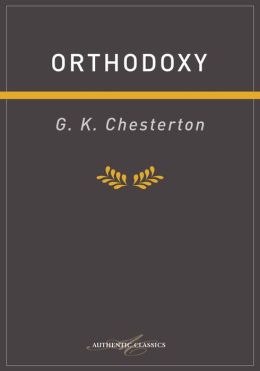The Book
Orthodoxy
G. K. Chesterton
Barnes and Noble contacted me with the settlement of a class-action lawsuit that entailed a $3 award. So, naturally, I went hunting for the cheapest versions I could find of the ebooks I have been dying to read. Chesterton's Orthodoxy is a clear example of a bucket-list book of theology that I have been meaning to get my eyes on. It has been an embarrassment for a while that I have never read it. That is, I had not read it until now.
As a big fan of C. S. Lewis' works, I was excited to read this piece. I have heard it compared to Mere Christianity as a more robust version of the piece. At first reading, I believe the two to be compatible, though written for different purposes. Remember, Mere Christianity was originally a radio talk about Christianity to be aired during the war, Orthodoxy is an account of G. K. Chesterton's journey to faith. These pieces are concerned with the same topics, but approach them from different perspectives.
Technical Merit
This title is beautifully written. Chesterton is a poet who decided to write a piece of prose. His phrasing is thought provoking and rich. At times, his diction can be a bit gaudy. For this reason, I plan to revisit this piece to ensure that I digested the material properly. It is a short book (my copy was only 155 pages) and was easily read in a week. It should not be too difficult to read again. However, for technical merit I certainly give Orthodoxy five of five stars.
Review
As mentioned in my introduction, Chesterton's Orthodoxy is an attempt to explain how he came to believe that Christian Orthodoxy is the only reasonable faith that explains the human experience. Over and over he reminds the reader how he came to a certain conclusion on his own, thought it was a uniquely enlightened position, and then turned to find the host of Orthodox Christendom standing on the same ground of truth. In other words, he used his reason to come to some conclusion about humanity and then found that Christianity had always affirmed that truth. The following quote comes to mind:
"I am the man who with the utmost daring discovered what had been discovered before." (pg. 9)This rehashes the adage (taken from Ecclesiastes) that there is nothing new under the sun. Everything has been seen before. Of the many arguments that Chesterton makes, they can be boiled down to one simple arument: the importance of paradox to Christianity.
"Christianity is the superhuman paradox whereby two opposite passions may blaze beside each other." (pg. 141)Chesterton gives example after example of how Christianity takes two opposing stances and reconciles them under one banner. Two examples of this are:
- The glorification of martyrdom while denouncing suicide.
- How Christianity can appear to be both a nightmare and a utopia at the same time.
"What again could this astonishing thing be like which people were so anxious to contradict, that in doing so they did not mind contradicting themselves?" (pg. 85)


